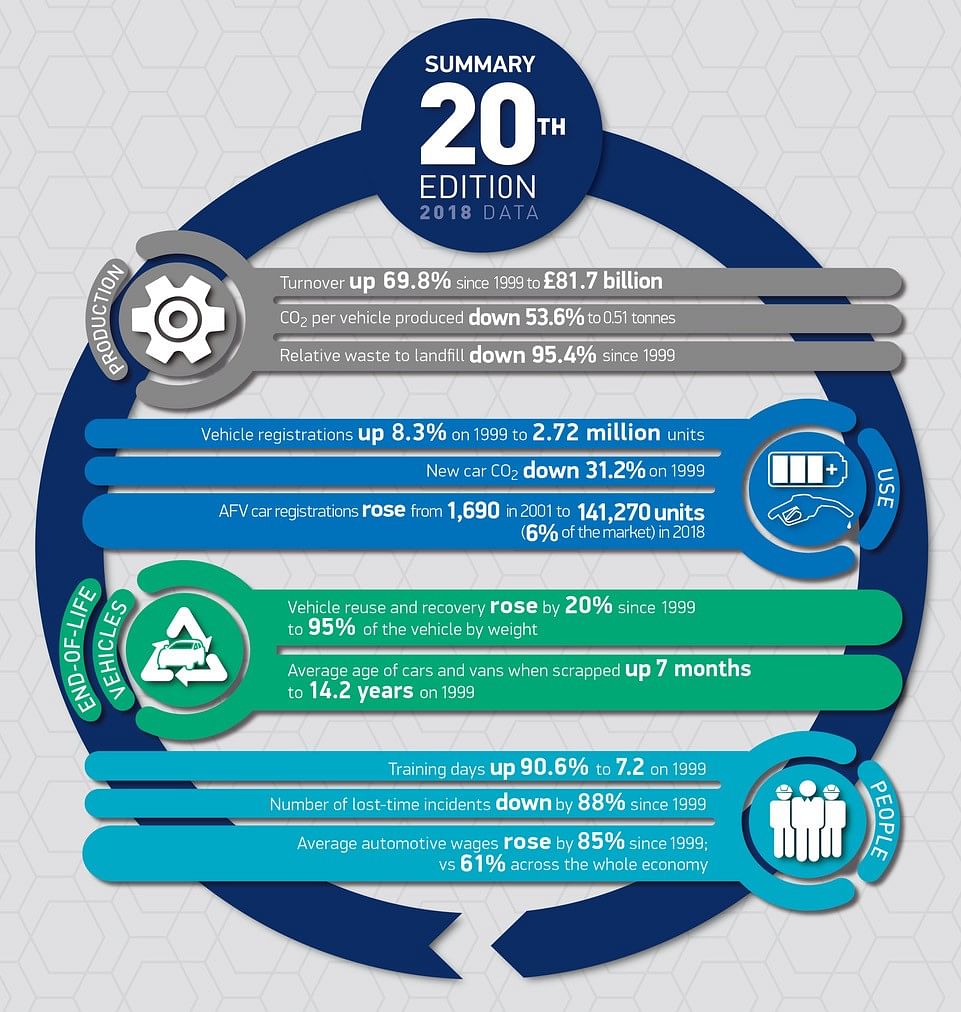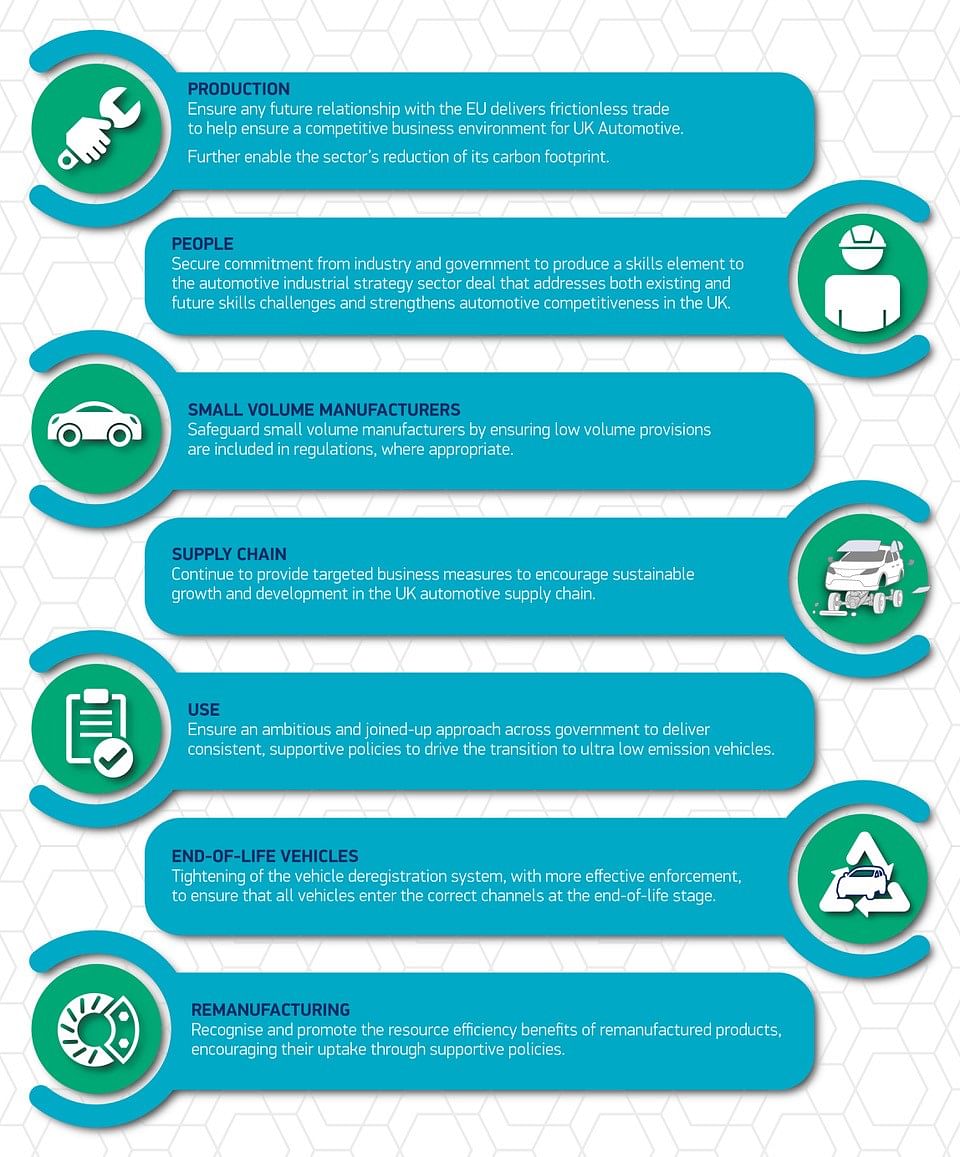UK motor industry turnover up 70% since 1999: SMMT’s 20th annual sustainability report
SMMT releases a report that highlights the increase in productivity, the energy savings, the CO2 reductions, earnings of the workers in the UK automotive industry. SMMT also urges for a smooth relation with the EU.
The progress of the UK Automotive in sustainable development was revealed today by new data published by the Society of Motor Manufacturers and Traders (SMMT). The 20th annual Sustainability Report reveals environmental, economic, and social gains achieved by the sector over the past two decades, highlighting the substantial improvements in areas such as energy and water use, waste to landfill and CO2 emissions.
Over the past 20 years, the UK automotive manufacturing has grown to become one of the UK’s most important economic assets, turning over £82 billion (Rs 700,195 crore) in 2018 – an uplift of 70 percent since the first sustainability report was published in 1999. At the same time, workers have experienced a significant wage boost, with average automotive wages having risen by 85 percent over the period compared with 61 percent across wider manufacturing (This is as per the ONS data – Based on average UK full time gross wage of £569 (Rs 48,547) for 52 weeks). Automotive manufacturing workers are now some of the UK’s better earners, with an average salary of £41,800; 40 percent higher than the national average. Meanwhile, productivity has increased considerably, with the automotive output per job growing by 208 percent from £32,000 to £100,900 (Rs 27 lakh to Rs 86 lakh). The value of exports has also grown significantly, with 81.5 percent of cars produced in 2018 destined for international markets compared with 63.9 percent in 1999.
SMMT reports that the UK automotive sector is now one of the most efficient in Europe, outperforming the EU average for energy, CO2 and water. Thanks to strict efficiency targets and continuous improvement and refinement of manufacturing processes, the sector has significantly reduced its environmental impact. Between 1999 and 2018, energy savings add up to power for 9.5 million homes for a year, while the CO2 saved would fill the Royal Albert Hall 37 times (8.9m tonnes saved). Recycling is also high on industry’s agenda, with manufacturers having saved 693,969 tonnes of waste from landfill, equal to the annual waste produced by households in Bristol, Leeds and Edinburgh combined (693,969 tonnes waste saved from landfill. Equals waste produced by 700k households annually or the waste of Bristol, Leeds and Edinburgh combined over a year). Meanwhile, the amount of water saved is equivalent to 813 litres of water for everyone in the UK.

These substantial advancements have been driven by massive investment in new models and plants. SMMT has confirmed that Brexit remains the biggest threat to the future competitiveness of UK Automotive. The UK’s future relationship with the EU must deliver frictionless trade, assure competitiveness and create an environment conducive for investment in the UK. This is vital for not only future economic growth, but to further improve the sector’s sustainable development.
Alongside advances in production processes, Industry has continued to invest heavily in developing the latest low-emission technology to address air quality and environmental concerns. Efforts to deliver ever more efficient cars have resulted in average new car CO2 falling 31.2 percent since 1999, while Nitrogen oxides (NOx) emissions have been cut by 84 percent since the turn of the millennium and exhaust particulate matter virtually eliminated.
Mike Hawes, SMMT chief executive, said, “Sustainability lies at the heart of the UK automotive sector and manufacturers are committed to balancing profitability and output with social and environmental responsibilities. Industry has invested heavily in ever safer, more efficient technology, but in processes and measures that have significantly reduced its environmental impact. We are on the cusp of a transport revolution and this sector has the potential to be one of the world’s leading forces driving the change. For the UK to reap the full benefits, any future relationship with the EU must assure our competitiveness, delivering frictionless trade and a supportive business environment to encourage investment.”

Also read: Brexit: what it means for the British car industry
UK auto bosses: 'Too much stress on EVs could harm environment'
British and Chinese auto sectors join forces, target business from megatrends
RELATED ARTICLES
Autoliv Plans JV for Advanced Safety Electronics With China’s HSAE
The new joint venture, which is to be located strategically near Shanghai and close to several existing Autoliv sites in...
JLR to Restart Production Over a Month After September Hacking
Manufacturing operations at the Tata Group-owned British luxury car and SUV manufacturer were shut down following a cybe...
BYD UK Sales Jump 880% in September to 11,271 units
Sales record sets the UK apart as the largest international market for BYD outside of China for the first time. The Seal...






 By Autocar Professional Bureau
By Autocar Professional Bureau
 16 Jul 2019
16 Jul 2019
 4996 Views
4996 Views





 Ajit Dalvi
Ajit Dalvi




